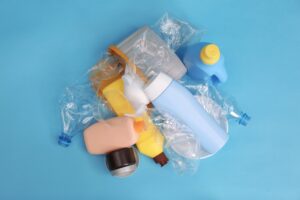Defining Hard Water
Hard water is water that contains high levels of dissolved minerals, primarily calcium and magnesium. These minerals are naturally picked up as water moves through soil and rock — especially limestone.
While not harmful to human health, hard water can affect plumbing, appliances, skin, and soap performance, making it a concern for both households and sustainability advocates.
How to Tell If You Have Hard Water
Common Signs:
- White mineral spots on dishes and glassware
- Soap scum buildup in sinks and bathtubs
- Dry, itchy skin or dull hair
- Reduced lathering of soap or shampoo
- Shorter lifespan of water heaters or appliances
- Stiff laundry after washing
Water Hardness Levels (mg/L or ppm of calcium carbonate):
| Hardness Level | Description |
|---|---|
| 0–60 mg/L | Soft |
| 61–120 mg/L | Moderately hard |
| 121–180 mg/L | Hard |
| 181+ mg/L | Very hard |
You can confirm your water’s hardness with a home test kit or by contacting your local water utility.
Effects of Hard Water
On Plumbing and Appliances:
- Scale buildup in pipes, reducing flow and efficiency
- Shortened lifespan of water heaters, dishwashers, and washing machines
- Increased energy usage due to poor heat transfer in scaled systems
On Skin and Hair:
- Can strip natural oils, causing dryness or irritation
- Makes shampoo and soap less effective
On Cleaning and Laundry:
- Soap reacts with minerals to form soap scum
- Hard water can dull colors and stiffen fabrics
Is Hard Water Safe to Drink?
Yes — hard water is not only safe to drink, but the calcium and magnesium it contains may actually offer minor health benefits. However, some people may dislike its taste or appearance.
Sustainable Approaches to Hard Water
1. Salt-Free Water Conditioners
Rather than removing minerals, these systems neutralize their ability to stick, reducing scale without chemicals.
- No brine discharge
- Lower maintenance
- Environmentally friendly
2. Template-Assisted Crystallization (TAC)
One of the most efficient eco-alternatives to traditional softeners. Converts minerals into harmless crystals that won’t adhere to surfaces.
- No salt or electricity required
- Minimal waste
3. Point-of-Use Filters
Install filters on showerheads or taps where scale buildup is most noticeable.
- Reduces cost and resource use
- Targeted solution for renters or small households
4. Manual Descaling Methods
- Clean appliances with vinegar or citric acid
- Regularly descale kettles, coffee machines, and showerheads
- Use borax or washing soda to improve laundry performance
Sustainability Concerns with Traditional Softeners
Salt-Based Ion Exchange Systems:
- Use large amounts of sodium chloride or potassium chloride
- Produce brine waste that harms soil and aquatic ecosystems
- Require water for regeneration cycles, leading to waste
Some municipalities have banned or restricted salt-based systems due to these environmental impacts.
Common Questions About Hard Water
- Is hard water bad for you?
No — it’s safe and may even provide beneficial minerals. - Can I use a water softener for drinking water?
Not ideal — softened water contains added sodium. Use a separate tap for drinking or a reverse osmosis system. - How can I reduce hard water effects naturally?
Use vinegar for cleaning, install filters, or try salt-free conditioning systems. - Does boiling water remove hardness?
Only temporary hardness. Permanent hardness caused by calcium sulfate remains. - Do plants like hard water?
Not always — high mineral content can interfere with soil pH and nutrient absorption. - Is bottled water better than hard tap water?
Not necessarily — bottled water has a higher environmental impact.
Final Thoughts: Hard Water Doesn’t Need a Hard Impact
Hard water is a natural part of many water supplies — but its effects don’t have to compromise your comfort or sustainability goals. By understanding your water’s mineral content and choosing the right eco-friendly solutions, you can protect your home, your skin, and the environment.
With salt-free systems, natural cleaning methods, and efficient appliances, you can soften your impact — without softening your values.









Reader Interactions